PhD Projects
Hybrid far-right environmentalism
Analyzing how the environmental discourses of far-right parties in Belgium and the Netherlands emerge through interactions between ideology, socio-political context, and media and audience uptake.

The rise of far-right parties and the ecological crisis are central to 21st-century politics, yet their intersection remains understudied. This gap is striking given the growing prominence of environmental issues in far-right discourses, evident, for example, in their capitalization on farmers’ protests. This research addresses this gap by introducing hybrid far-right environmentalism, which captures how far-right environmental discourses emerge through interactions between ideology, socio-political context, and media and audience uptake. Focusing on Vlaams Belang (VB) in Belgium and Partij voor de Vrijheid (PVV) in the Netherlands, this study examines how these parties construct hybrid far-right environmentalism by aligning it with their ideology, responding to socio-political opportunities and challenges, and considering media and audience uptake. The analysis unfolds across three interrelated levels: how far-right parties construct environmental discourses, how media disseminate these discourses, and how audiences interpret them. Three key environmental issues structure the analysis at each level: farmers’ protests (2019–today), climate protests (2019–today), and the energy crisis (2021–today). By integrating discourse, political, and communication studies, this research contributes to the study of the far right-environment nexus and advances understanding of how political discourse emerges through interactions between ideology, context, and uptake.
Project Details
Start: November 2025; End: October 2029
Funding: FWO
Researcher: Gijs Lambrechts
Academic supervisor: Benjamin De Cleen
Video game fiction and far-right gender politics

Video game fandoms and their often reactionary, masculinist grievances have frequently synergised with far-right identity politics, whilst far-right digital actors co-opt said grievances and produce content on gaming-centric platforms. Literature, however, neglects to explore the role of the fictional content of video games in such far-right identity discourses, despite the fact that games are uniquely structured and culturally positioned to provoke reflections on identity.
This project explores this role of video game fictions in far-right gender politics on three dimensions, which capture both the nuances of the digital far Right and the specificities of games: the strategic, collective and ludic dimensions. The strategic dimension interrogates the strategic role of video game fiction in the gender discourses of far-right influencers; the collective dimension explores how video game fictions provide a sense of gendered collectivity in far-right digital communities; and the ludic dimension explores how far-right streamers play games and perform or relate to gender in the ludic space.
The project aims to uncover unique insights regarding the relationship of far-right metapolitics, identity and community to fiction, storytelling and popular culture generally, emphasising the ways in which video games are unique manifestations of these things. It seeks therefore not only answer to questions about far-right gender politics, but pioneer theoretical and methodological approaches to understanding games and gameplay as constituting and producing unique forms of discourse.
Project Details
Started on: September 2024
Researcher: Briar Dickey
Co-promotors: Benjamin De Cleen; Kevin Smets
COMPARING CLIMATE CHANNGE PERCEPTIONS AND EXPLORING COMMUNICATION STRATEGIES: CHINA VS EU

In the face of global climate change challenges, China and the EU stand at the forefront of climate action, underscoring the importance of comprehending public perceptions within these regions. While previous research on public perceptions of climate change primarily focuses on the US, the few comparative studies between China and the US lack comprehensive analysis of underlying factors. Notably, there's a lack of comparative research on climate change perceptions between China and Europe.
This study is trying to address three key questions: 1) What are the significant differences in public perceptions of climate change between China and Europe? 2) What factors shape these perceptions? 3) What communication strategies are most effective in China and Europe based on the different perceptions and shaping factors?
To achieve the above objectives, this research seeks to employ resonance analysis—a methodology comprising elicitation test, semantic coding, and Multiple Correspondence Analysis (MCA). As a data analysis technique, MCA allows to graphically present categorical information of multiple variables and visualize the distances (relations) between these variables in the form of a multidimensional map. The potential findings may hold significance in providing a nuanced understanding of climate change perceptions in China and the EU, along with the underlying factors, thereby informing policymakers and climate communicators, which can promote international cooperation and public engagement in the fight against climate change.
Project Details
Started: October 2023
Researcher: Kunpeng Ma
Academic promotor(s): Pascal Verhoest
Co-supervisor: Joke Bauwens; Yazan Badran
Emotions, subjectivity, and objectivity in metajournalistic discourses

This project examines the presence and role of emotions across various types of metajournalistic discourses. Metajournalistic discourses (MJD) are discourses about journalism’s definition, boundaries, and legitimacy (Carlson, 2016). These discourses, produced by journalists and non-journalists alike, occur across various sites both within and outside of traditional news. Through the analysis of emotions in MJD, this project aims to understand how journalists’ emotions move from the private to the public, and how different sites of metajournalistic discourses allow for the expression and the visibility of certain emotions. To achieve this, the project employs three methodological approaches: (1) discourse analysis, (2) semi-structured in-depth interviews, and (3) ethnography. The selected data correspond to these methodologies and include a magazine column, a podcast, journalist interviews, and journalism (film) festivals. In addition to the findings on emotions, each of the methods will also be evaluated for its strengths and limitations in studying journalists’ emotions, building on existing literature for researching emotions in the social sciences (Flam & Kleres, 2015).
Project Details
Started: October 2022
Researcher: Anna Luo
Academic promotor: Yazan Badran
Co-supervisor: Johana Kotišová
Fandom Across Generations: Analyzing Belgian Fan Clubs of Hollywood Franchises

This PhD project analyses Belgian fan clubs of long-running Hollywood franchises, considering three broad pillars: 1) the organisation of the clubs, 2) the creation of fan content or paratexts and 3) the perceptions of the members towards the studios. With the advent of the Internet, fans have become more ubiquitous than ever. They actively share a wealth of information and fan content online. However, it’s essential to recognize that organized clubs for both well-known and lesser-known franchises continue to emerge today. These clubs provide fans with the opportunity to move beyond the virtual world and connect physically. Today's nostalgia-driven Hollywood blockbusters have ensured that our cinemas are flooded with sequels to old IPs. These also give new generations the opportunity to embrace the characters of these franchises, develop their identities around them and join existing fan clubs. This research focuses on the phenomenon of old and new fans coming together in these physical spaces. (How) do younger fans find their way into these clubs? How do these groups navigate cross-generational membership? How do older and younger fans interact with each other and respond to production decisions within the franchises? To address these inquiries, we conduct an analysis of fan clubs in Belgium, a country with a strong tradition of participation in community life. Within this study, explanatory concepts such as fan apprenticeship, fan cultures, totemic nostalgia and paratext are covered.
Project Details
Started: October 2022
Researcher: Florian Stegen
Academic Promotor: Kevin Smets
Negotiating historical television in an era of polarization and austerity
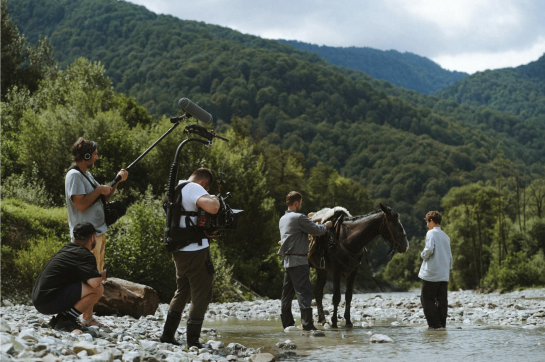
This research investigates historical television as a key space for negotiating shared narratives and imagined communities, amid political polarization and reduced funding for public culture. Despite ample previous research on historical television and national identity, little is known about its current role for European communities grappling with the rise of right-wing movements and globalization. This study centers Flanders, Belgium’s northern region, where notions of national identity are sensitive and right-wing policies are interested in promoting sub-state nationalism through public channels. Contributing to European media studies and memory studies, this research examines how three vital agentic groups - (1) heritage specialists, (2) production, and (3) reception - make do in the face of hegemonic strategies. The study highlights how different historical programs contribute to national identity construction while simultaneously engaging with global storytelling conventions and market dynamics encouraging heritage consumption and screen tourism. It critically examines the tensions between local historiography, fear for instrumentalization and commercialization of history.
Project Details
Started: October 2022
Researcher: Sofie Vermoesen
Academic promotor: Kevin Smets
Co-supervisor: Lennart Soberon
Pseudo-journalistic political communication: When politicians act like journalists

This PhD project analyzes the use of journalistic genres in political communication, focusing on the Belgian Vlaams Belang (VB) and the German Alternative für Deutschland (AfD) as populist radical right (PRR) parties that are key players in the contemporary hybridization of political communication. Bridging journalism studies, political communication and genre as well as discourse studies, the study proposes the term pseudo-journalistic political communication to capture hybrid genres that emerge through the integration of journalistic genre resources into political communication. Taking into account complex interactions between content, production and reception in the negotiation of genres, it examines three interrelated levels. On a content level, it constructs a typology of uses of journalistic genres in PRR political communication, and then performs an in-depth multimodal genre analysis on a subset of content that makes substantive and structural use of journalistic genres. On a production level, a social network analysis supplemented with semi-structured qualitative interviews constructs a detailed map of the production context of such pseudo-journalistic political communication. On a reception level, the study performs a digital ethnography of how audiences engage with pseudo-journalistic political communication. Through its focus on pseudo-journalistic political communication the research fills a significant gap in the literature on political communication, on PRR parties, as well as on the contemporary politics-journalism nexus more broadly.
Project Details
Started: November 2022; End: October 2026
Funding: FWO
Researcher: Maximilian Grönegräs
Academic Promotors: Benjamin De Cleen; Yazan Badran
Challenging border epistemologies from below: Participatory filmmaking at the dividing lines of Ireland, Morocco-Spain and Syria-Turkey
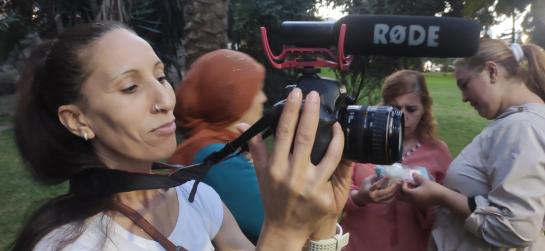
Participatory filmmaking (PF), or participatory video (PV), has been used since the 1960s to collect, generate and disseminate knowledge by engaging people in making films according to their sense of what is important. In the context of border and migration research, it can be an effective tool for creating safe spaces to create vernacular narratives about borders and share them with a wider audience. Moreover, when used in projects set in borderlands, PF can bring first-hand knowledge and awareness of how people living in borderlands carry the border within themselves. The seminal literature on PF, mostly labelled as a-critical, has been centred in analysing crucial components that this methodology should fulfil as a critical media pedagogy and literacy, such as awareness, participation, cooperation, and agency. However, specific ethical and methodological challenges arise within the practice of PF, especially when implementing it in borderlands where cultural, gender, class, and race inequalities are exposed. In order to address these challenges, it is essential to depart from intersectional viewpoints, ensure safety and reciprocity, and use a critical feminist decolonial approach to scrutinize some of the biases that can undermine a PF project. The present thesis intends to address this gap in the current literature by examining the advantages and pitfalls of using this methodology in border and migration research. Specifically, the goal is to co-create, co-analyse, and share through PF first-hand experiences of people who live in three borderlands (Ireland, Morocco/Spain, and Syria/Turkey) to challenge current border and migration epistemologies from below. The thesis outlines three primary research questions:
- To what extent can PF be conceptualised as a potential methodology in border and migration studies by attending the theory-practice interface in the light of everyday dynamics of bordering?
- What are the ethical and methodological challenges of conducting PF research at the borders of Ireland, Morocco/Spain, and Syria/Turkey?
- How can PF contribute to bringing epistemic justice and challenging existing epistemologies on borders and migration from a grassroots perspective?
The scientific and social relevance of this study lies in the following:
1) The need to create a conceptual framework of PF for migration and border studies that goes beyond the dominant nation-state logic and the Eurocentric perspective within the disciplines. Such theoretical framework should also examine the technological and representational canons of filmmaking considering the technical, economic, and socio-cultural factors involved.
2) The innovative implementation of PF in three different border areas can contribute to its development as a methodology that aims to critically address the potential of participatory creative methods in migration and border research on a large scale. This can be achieved by involving a large sample of participants, from cross-border citizens to undocumented migrants, at all stages.
3) A critical perspective that incorporates decolonial feminist visions at the intersection of migration, border, and film studies can effectively challenge current migration and border epistemologies. By doing so, we can use film as a tool of knowledge to promote epistemic justice and alternative border and migration narratives based on processes of becoming and belonging. The dissertation is part of the European Research Council Starting Grant #948278 REEL BORDERS. More info: https://reelborders.eu/
Project Details
Started on 01/03/21
Researcher: Irene Gutiérrez
Academic Promotor: Kevin Smets.
From Sacred to Subaltern: the politics of postcolonial language appropriation and abrogation in social media texts by Pakistani transgender activists
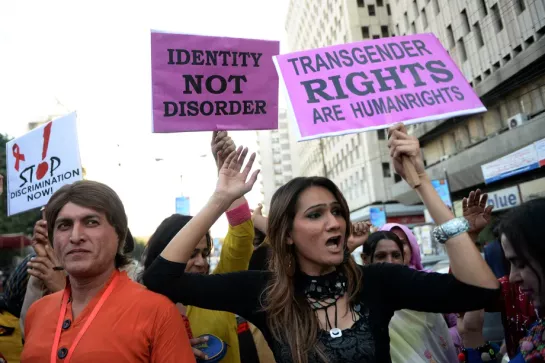
Marginalized communities in postcolonial societies, in particular transgender people, face unique challenges when consciously displaying their gender and/or sexual identity. Drawing upon the postcolonial concepts of language appropriation and abrogation – typically only limited to the literary tradition – this project seeks to understand how colonial language and aesthetics are articulated in media by diverse transgender activists in the Pakistani context. I do this through the case study of the indigenous khwajasira community – an overarching term for transgender, non-binary, and gender nonconforming people, often known as the “third gender” or as gender category X in legal communication, and more popularly as hijra in the South Asian region. Intersecting postcolonial studies, gender communication, and digital cultures, this project analyzes the tension between linguistic appropriation and abrogation (Ashcroft, Griffiths, & Tiffin, 1989, 2002) combined with multimodal critical discourse analysis (Kress & van Leeuwen, 2006; Machin & Mayr 2012), intertextuality and interdiscursivity (Fairclough, 2003). Considering the intricacies of varied discursive repertoires, we delineate three categories of activists at the language level, including English-centric activists, bilingual or multilingual activists and Urdu-centric activists. For each linguistic orientation, we consider four transgender activists to capture a range of perspectives, discourses, and linguistic expressions within the khwajasira community through social media texts produced on Twitter (now X), Instagram, and YouTube. We meticulously scrutinize around 100-200 social media posts for each activist, considering their posting frequency, engagement metrics, and visibility on Instagram, YouTube, and Twitter (now X). Through a close reading of online cultural artefacts and texts from these activists, we analyze language as a fraught and contested site through which the postcolonial condition is negotiated for those on the margins. Centering on appropriation and abrogation, we evaluate innovative linguistic and textual strategies such as untranslated words, codeswitching, codemixing, metonymic gap, interlanguage, and neologism. Our exploration of social media texts and the discourses surrounding them reveal nuanced insights into the ways in which marginalized communities use language to resist, decolonize, and dismantle dominant power relations. More importantly, this research bridges a significant gap in the literature on postcolonialism, more importantly on the application of the postcolonial literary toolkit in a non-literary and mediatized context. . Beyond this, the research project decenters and overcomes Anglo-Eurocentric perspectives in the LGBTQIA+ scholarly tradition in the context of negotiating transgender identities in postcolonial milieus and shaping our understanding of queer discursive practices emerging in South Asia.
Project Details
Started: October 2020
Researcher: Fatima Zahid Ali
Academic Promotor: Kevin Smets; Benjamin De Cleen.
Of Populists and Euro Bubbles: How Europe’s far-right political movements are covered by the Brussels Press Corps
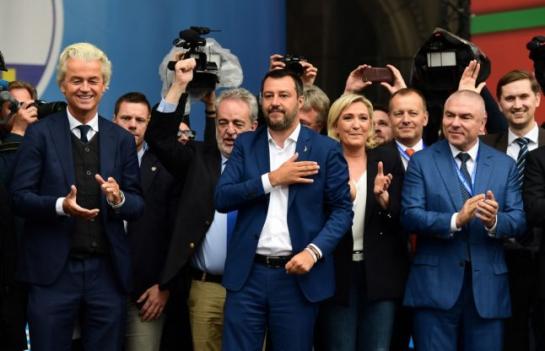
This project aims to explore how far right-wing political parties and movements in Europe are covered by the Brussels Press Corps. This research becomes particularly important as the concept of a European identity and transnational trends in politics grows and shapes a European public sphere amidst the backdrop of Brussels' growing political and legislative power on the continent. Meanwhile, as the influence of the EU institutions strengthens and encroaches on national jurisdictions, far-right movements have emerged across Europe and come to shape the national debate surrounding EU membership and power centralization in Brussels. Given the professional duty of the Brussels Press Corps to report on the growing political importance and power held in Brussels amidst the growing popularity of far-right movements across Europe, the central question this project examines is how the Brussels Press Corps cover far-right governments and movements in the EU.
Project Details
Started on 01/09/20
Researcher: Kait Bolongaro
Academic Promotor: Benjamin De Cleen
New dynamics of Turkish and Kurdish chain migration to London and Brussels: a visual sociological study
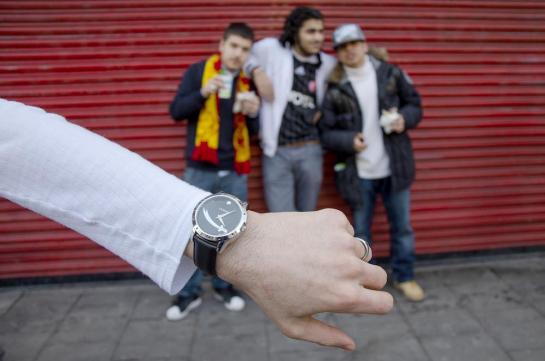
This project aims to explore the experiences of recent migrants from Turkey to London and Brussels through the concept of urban citizenship. It intends to discover complexities and nuances of newcomers’ relations with established diaspora and host communities within the urban spaces of these cities. As these places, both diverse global cities, form the immediate spaces in which migrants articulate and construct their being, visual research methods, in particular filming, will shed light on these matters. Moreover, it aims to explore how audio-visual research methods can help us to understand contrasting experiences of the city and mobility.
Project Details
Started on 01/09/19
Funding: EUTOPIA – Co-tutelle PhD programme between University of Warwick and VUB
Researcher: Yasemin Karsli
Academic Promotor: Kevin Smets, Hannah Jones
Understanding the notions of public and private in the Chinese context: the case of the Chinese social media regulation

The notions of ‘public’ and ‘private’ have been core concepts in Western thought since classical antiquity. The question whether the public-private dichotomy is suitable for understanding a non-western context is rarely asked in academic research. Western political discourse and media regularly apply Western concepts and values to non-Western contexts, for instance in relation to the Chinese notions of ‘private’ vs ‘public’. This research aims at providing an alternative perspective on the public/private debate. Furthermore, it investigates how these notions differ in the Chinese and Western contexts, and how they materialize in the Chinese social media regulation.
Project Details
Started on 14/09/16
Researcher: Jinxixi Lyu;
Funding: China scholarship council (CSC).
Academic Promotor: Katia Segers
Co-supervisors: Pascal Verhoest; Joke Bauwens.
Completed PhD Projects
Disentangling Far-Right Gender Discourses
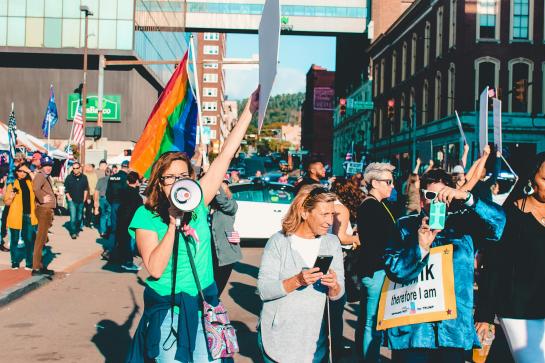
In early 2023, reacting to an article of the Flemish weekly Knack titled “Women and the far right: why do women vote for parties that want to restrict their rights?”, Vlaams Belang published a statement on its website, claiming that there were no “bigger defenders of women’s rights” than them.
Similarly, two years earlier, the Flemish MP Sam Van Rooy argued in the Flemish Parliament that Vlaams Belang is “the most gay-friendly party”, claiming that “LGBTQI+ individuals who want to be safe and free choose Vlaams Belang, and there are more and more of them!”.
Thus, despite its historical opposition to women’s and LGBTQ+ rights, Vlaams Belang now counterintuitively claims to be a champion of women's and LGBTQ+ rights.
How can we explain this situation? What are the different components of Vlaams Belang’s contemporary gender discourses (i.e., the far-right party’s discourses regarding gender equality and sexuality issues), how have they evolved, and how can the apparent contradictions between them be explained? This thesis aims to answer those questions, by disentangling the Flemish far-right party’s gender discourses, as well as by highlighting their patriarchal nature.
Project Details
Ended on 19/6/2025
Researcher: Archibald Gustin
Promotor: Geoffrey Grandjean (Université de Liège) & Benjamin De Cleen
Conceptualizing Hybrid-Fiction
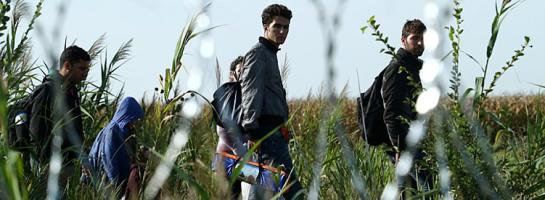
Migration is amongst the most emotive themes in today's societies. It has become the hub of people's worries and fears, and mass media have often echoed such feelings. New ways of reporting this compelling subject can tell a different story, drawing attention to the political, economic, and social magnitude of migration while, simultaneously, reaffirming the humanity of migrants. Media and migration research has, up to now, exclusively considered cinema, documentary, traditional news, and data-visualization as separate genres. Consequently, powerful and original productions on migration have gone unnoticed due to their intrinsic nature of hybrid objects.
Project Details
Started on 1/11/2020
Ended on 19/5/2025
Researcher: Giacomo Toffano
Academic Promotor: Kevin Smets
China as an 'Imagined Other 'in Europe

This project aims to investigate if stereotypical perceptions towards China/ Chinese people exist among Europeans. The main objectives are exploring the cognitive process of stereotypes and the links between stereotypes and media framing, plus a variety of social factors. The "cognitive resonance approach" is employed as the methodology. In short, it combines elicitation tests, semantic coding with cluster analysis to uncover and categorize the cognitive schemes that explain the perceptions of different population groups. Additionally, an analysis of media usage, intergroup contact, racial attitudes, social-distance scale and cosmopolitism are used to investigate the extent to which shared perceptions relate to common values and sentiments towards China and Chinese people. Furthermore, the way in which these factors interact with each other will be explored in a social and cultural context through a statistical modelling.
Project Details
Funding: China scholarship council ( CSC)
Researcher: Yuejue Zhang
Academic Promotor: Pascal Verhoest
Media discourses about populism: protecting what kind of democracy?
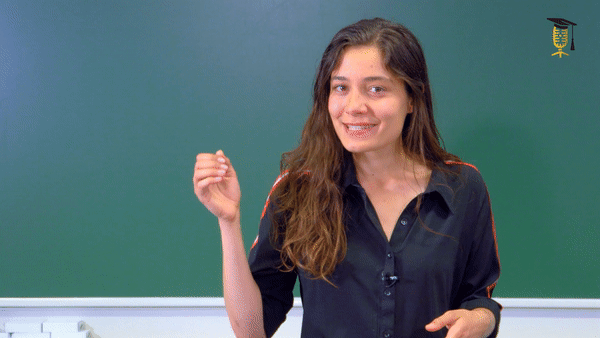
Over the course of these last few years, ‘populism’ seemed to be everywhere. Not only populist actors appeared everywhere, but the term ‘populism’ became omnipresent in media coverage. When journalists increasingly use ‘populism’, this is however not a mere consequence of the rise of populist politics, and the coverage of such politics as ‘populist’ has an impact on the prevalence and success of populist politics. Journalists often seem to use populism in relation to democracy, and more specifically to criticize certain kinds of politics. This PhD research looked at how Belgian journalists, academics and politicians use ‘populism’ to discursively construct the boundaries of democracy.
Project Details
Started on 1/10/2017,
Ended on 1/10/2023
Researcher: Jana Goyvaerts
Academic Promotor: Benjamin De Cleen
A multilevel and mixed methods investigation into the role of media capture in media systems in transitional democracies: the case of Iraqi Kurdistan
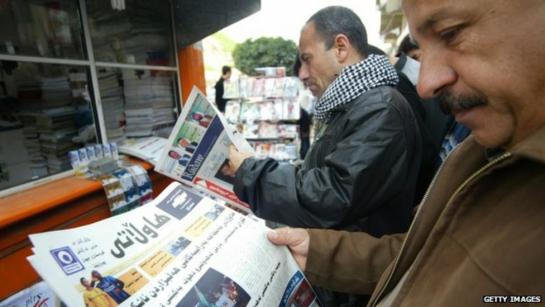
When authoritarian regimes are overthrown, it is commonly expected that the emerging political systems will adopt many aspects of Western-based models of democratic government, including models of parliamentary democracy, human rights, and freedom of speech. According to existing studies, however, the practical realities of these ‘transitional democracies’ often defy this expectation. The aim of this research proposal is to investigate how the concept of media capture allows us to understand media systems in transitional democracies by analysing the different mechanisms with which powerful social actors attempt to control media in the case of Iraqi Kurdistan. To this end, it puts forward a highly innovative mixed methods design, in which a quantitative content analysis is used for the level of financing, document analysis and interviews with state officials and politicians for the level of regulatory control, and interviews with journalists and editors in chief for the level of journalistic culture. In this way, this proposal not only puts forward a multi-methodological approach that combines the paradigm of political economy with rigorous social-scientific research. It also makes this study comprehensive and able to triangulate its results across these different levels, thereby offering a multidimensional picture of how these mechanisms add to our understanding of (the level of media capture in) media systems in transitional democracies.
Project Details
Started on 1/10/2016
Ended on 1/10/2023
Researcher: Jiyan Faris
Academic Promotors: Pieter Maeseele, Kevin Smets.
The Evolution Of THE TERMS REFERRING TO PEOPLE ON THE MOVE
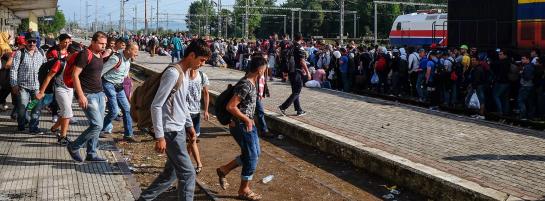
Words defining people in migration (e.g. refugee, migrant, immigrant, asylum-seeker, illegal, displaced person) are not fixed in time. Indeed, their meaning and reference evolve according to events and social representations, contributing to constructing both the public issue and the image of the social actors involved. The aim of this research is to understand, through a lexical discourse analysis, the evolution of the meanings of the terms mentioned above and the way they are used in Belgian national media in French and Dutch. The analysis will focus on newspapers and television news from March 2015 to July 2017.
Project Details
Funding: FRESH (FNRS)
Ended on 23/03/2023
Researcher: Valériane Mistiaen
Co-tutelle ULB/VUB, with promotors: Laura Calabrese (ULB) and Benjamin De Cleen (VUB).
Making sense of Transdisciplinary Learning Research Communities for vulnerable contexts in Bolivia
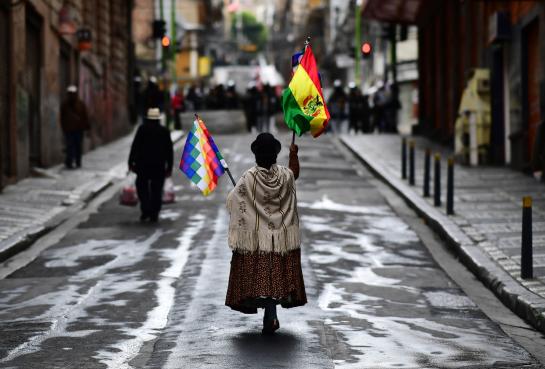
The aim of this research is to understand how the different actors of an inter-university program for social development -between Belgium and Bolivia- tell, discuss, build, and experience the sensemaking of “Transdisciplinary Learning Communities”. “TLC” (for short) is the methodological approach of this program. The research is based on a critical sensemaking perspective, where power relations, tensions, and struggles play an important role. This research analyzes the discourses, narratives, and interactions of the actors involved (micro level) and the link between these communicational practices with the academic institutional context (meso level), and the chosen vulnerable contexts in Bolivia (macro level). Against this backdrop, the research intends to develop a “critical sensemaking model” which can be applied in other social and communication studies.
Project Details
Started on 01/10/18
Ended on 11/01/2023
Researcher: Guadalupe Peres Cajas;
Academic Promotor: Joke Bauwens; Marc Craps; Gerrit Loots.
New Communication Spaces in the Arab World
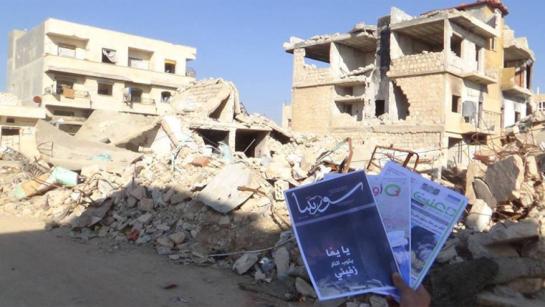
The study aims to investigate the new communication spaces opening up in the Arab World, by looking at emerging media organisations as a specific category of media producers in Tunisia, Egypt and Syria. The study aims at examining the phenomenon of emerging media organisations beyond the dichotomy of mass and alternative media. Moreover, it intends to outline the structural conditions (state relations and regulation, ownership structures and financing models) that condition the operations of emerging media organisations in Tunisia, Egypt and Syria. It also aims to analyse the processes of resistance, negotiation and mediation that take place at the level of the organisation and the journalistic values it produces. The study adopts a mixed-method approach that allows for a more in-depth understanding of the target organisations. It includes extensive research stays at the different countries (Turkey, in the case of Syrian media) with several weeks of participant observations at each organisation.
Project Details
Started on 01/11/18
Ended on 31/12/21
Researcher: Yazan Badran
Academic Promotor: Kevin Smets
